The most disappointing result was not that on the ice. Cornell has the time, admittedly not much of it (but more on that later), to rectify the damage done this past weekend. What was most upsetting was the behavior of the ticket holders. No other term can describe them accurately. Many of the students occupying standing space in Sections D and E were not fans in attendance at Lynah Rink for the games on Friday and Saturday. The trend did not influence Sections A and B to a great degree.
The ticket holders to whom I am referring left the Brown game after Brown's last goal with just 11 seconds remaining in the game and during the handshake. These sections were largely empty by the time that Cornell saluted their fans. The situation was no different the evening before when Cornell saluted large swaths of empty sections in the student section after a hard-fought and close game between Cornell and Yale that was decided in overtime.
This behavior is indefensible in almost all situations for sports at any level, especially sports at the collegiate level. It is ungracious and rude. Watching droves of petulant ticket holders head for the exits before the Big Red has saluted them shows that they are not deserving of the title born on many of their shirts as they climbed the stairs out of Cornell's historic barn. Cornell should be above this. And, anyone who wishes to call themselves Lynah Faithful must be above this behavior.
Lynah was not empty during the mid-1970s, the 1980s, or the early 1990s when Cornell won only two ECAC Championships in that span. I doubt that many of the ticket holders leaving realize that fact. Cornell hockey has been defined for its rabidity during both up and down swings, during games both good and bad. That is what sets Cornell hockey apart; a belief that supporting a team and program through the tough times will make the sweetness of the great times seem all the sweeter realized through action.
Cornellians who understand the history of our great University realize that the institution was found in contradistinction to the culture and values of other historic and august institutions of higher learning. The dearth of dedication and sense of entitlement manifested in leaving Lynah before the ceremonial stick salute are the type of behaviors from which Cornell's founders hoped to set our University apart. Impolitely sulking away during a painful or bad loss before showing one's appreciation for one's representative student-athletes is not only sportsmanship unbefitting of Cornell fandom, but contrary to many elements of the essence of what it always has meant to be a Cornell man or woman.
WAFT has analogized the bond amongst members of the Lynah Faithful, and between the Lynah Faithful and generations of Cornell teams as one resembling that of family. Cornellians are family. We all share the same "nourishing mother." One can expect more of family. The Lynah Faithful and any ticket holders who hope to gain that designation cannot walk out on this team or any Cornell team during a game. It is disgraceful. We should expect more of each other. The quick glances of senior student-athletes on this Cornell team to survey the range of the student section finding it yet unfilled during the singing of both national anthems and emptying before the Lynah Salute show that they know that they expect more. They deserve better.
Where We Stand
The weekend can be captured in one brief event that occurred during last Saturday's game against Brown. An opportunity presented itself that quite literally allowed Brown to fire a shot into a wide-open, empty net. Barely seven minutes later the event transpired. Brown once again scored a soft goal. Cornell senior captain D'Agostino skated behind Cornell's net and inconspicuously slapped his stick against the ice in apparent annoyance and frustration. The cause of this frustration seems apparent. I have to agree with the senior captain.
Sometimes rehashing the weekend is too painful. Such is the case for this past weekend. However, the reason for which it is painful to recollect each game is distinct. Cornell seemed on the cusp of reasserting its prowess and begin realizing its potential again in a game against Yale. A victory over Brown seemed all but certain if Cornell delivered a performance that resembled the one from the previous night. The Big Red did not.
The weekend was not representative of a poor performance for Cornell as a whole. Cornell generated great offense against Yale, kept pace with the Bulldogs in terms of generation of shots and offensive opportunities, kept the Elis in their own zone as was key to the game, and in two battles in front of the net in overtime nearly ended the game in favor of the Red. The Brown game as outlined went as poorly overall as one could expect. Cornell generated key offense, hit several posts, but the Bears's Borelli was equal to each challenge and Cornell allowed in three soft goals with the last coming with just 11 seconds remaining in the game.
Cornell generated impressive offensive opportunities, but could not convert. McCarron and Miller nearly converted on several opportunities that would have earned the go-ahead or winning goal late in the Yale game. However, the sad reality is that we have ventured outside the time of the season when process can be celebrated for process' sake. Process is only so good as the results it generates at this point in the season and Cornell earned no points in the ECAC standings last weekend.
WAFT has departed from highlighting key contributions of often unsung players in games over the weekend. However, the performance of three players deserve special attention. Senior captain Axell, senior forward Mihalik, and junior defenseman Gotovets were great over both games this past weekend. Axell and Mihalik were on the cusp of scoring crucial goals in both games while both had astounding contributions on the backcheck that led to key turnovers that kept the pressure on Yale and Brown. A national audience was made aware of one of Gotovets's many defensive contributions this last weekend. The broadcast of the Yale game on NBC Sports highlighted how it was a diving Gotovets that blocked a shot in the last seconds of regulation that otherwise would have gone into an empty net. Game-saving or -preserving plays like that were common from the junior defenseman this weekend.
The penalty kill prevented Yale that brought the sixth-ranked power-play unit in the nation to Lynah Rink from scoring on any of its power-play opportunities. Cornell had killed off 100% of its opponents's power-play opportunities until the last 11 seconds of the game against Brown. Cornell completed the weekend with a 90% penalty kill efficiency. Cornell did not seem as dominant with penalty killing as it did at Denver, but glimpses of that stellar performance in the second game at Magness Arena began to reemerge.
The good news ends there.
Cornell converted on only 11% of its power-play opportunities over the weekend. Cornell would not be invited to the 2013 NCAA Tournament were the Tournament to begin today. The uncommon zero-point weekend for Cornell has made the remainder of the season all-important.
Cornell sits currently in the ECAC standings in a three-way tie that spans eighth through tenth place. Cornell has a game in hand over only three of those team that are higher in the current ECAC standings. This position draws into question if Cornell would have home ice in the first round let alone a first-round bye in the 2013 ECAC Tournament. Schafer emphasizes the importance of a first-round bye to winning an ECAC Championship. This likely has been a goal for this team and remains a goal for this team.
For those who do not remember or who are unaware, only the top four seeds entering the ECAC Tournament receive a first-round bye. Third place is currently five points away from the Big Red's current point total in the ECAC standings.
Schafer stated in a recent interview that his general philosophy in the run-up to the playoffs is the mindset that Cornell should be contented if it earns splits of all weekend series on the road and sweeps of all weekend series at Lynah. Cornell earned the split during its first weekend. It did not earn a sweep last weekend. Cornell is four points behind Schafer's idealized pace.
A cause for further embarrassment is that Cornell now owns a record below 0.500 on the 2012-13 season to date. Cornell's current winning percentage is 0.474. WAFT does not believe the naysayers who are predicting that this Cornell team will not finish the season above 0.500. Cornell's winning percentage highlights merely the precariousness of Cornell's chance at even attempting to realize its goals in the post-season.
The Road Ahead
There are two facts that can make what could appear hopeless seem hopeful. Cornell has only one game less than half of its ECAC regular-season slate remaining. Cornell has 10 ECAC regular-season games remaining. Colgate is the one opponent that Cornell will not play again in the regular season. The Big Red notched a win and a tie when it had the chance against the Raiders. Cornell will play each other opponent in the ECAC again in the regular season. Chances at redemption abound.
The second fact is that there are enough pairwise points within the ECAC this season that Cornell can rise rapidly in terms of consideration for the 2013 NCAA Tournament. This is an uncommon phenomenon. The greatest density and most valuable pairwise points that will allow Cornell to climb most rapidly are tied up in Quinnipiac and Yale. Cornell will face the former in just over a week's time at Lynah Rink and the latter at Ingalls Rink to close out the regular season. These games cannot be regarded as anything but must-win games.
Cornell managed such a performance last season when it knew crucial pairwise points were on the line for a key game. Cornell defeated convincingly Union, 3-2, at Lynah Rink in a win that helped propel Cornell into the 2012 NCAA Tournament. Cornell managed this feat just last season, there is little reason to doubt that this team can do the same against Quinnipiac and Yale.
Symbolically, Cornell needs a statement win or wins to reassert itself and to regain its confidence. Had Cornell's first weekends of ECAC play after the holiday break gone better, the games against Yale and Quinnipiac could have served that purpose. This team this season needs ECAC points desperately. Cornell ventures to the North Country this weekend. The series against Clarkson and St. Lawrence can serve two ends. Wins in this series can be both symbolic and effective in boosting Cornell's ECAC standing.
A four-point weekend is all but needed for Cornell in terms of ECAC standings. Cornell needs to claw its way back to a place in the ECAC standings that will allow it to enjoy a first-round bye. Cornell swept Clarkson and St. Lawrence when they braved Lynah Rink earlier this season. However, as was evidenced by the reaction of commentators to Yale's sweep in the North Country, a weekend sweep of Appleton and Cheel has separate meaning. The last times that Cornell swept the North Country were in 2003 and 2005. Those years have gained nearly mythical status in the minds of Cornellians. If Cornell manages a sweep of the North Country this weekend, it would be a symbolic statement of great weight.
The story of the remainder of the 97th season is unwritten. The decision must be made within the locker room, whether it is among the coaching staff, captains, or other leaders on the team, that this is the moment when Cornell will right its course one last time this season. This team is supremely talented. There is no more talented team in the ECAC. However, the potentiality of talent is useless until it is put into the kinetics of results. The choice must be made that this team will not be stopped or denied.
Last season, at the close of January 2012, one team suffered an embarrassing loss to a nearly unranked opponent. That team made a decision much like the one that is above described. That team did not lose a game for the remainder of the season and ended the season hoisting the national-championship trophy in Tampa Bay, FL.
There is no reason in terms of skill, hard work, or wherewithal that this Cornell team cannot do the same.
The fact remains that time is running out. There is increasingly less margin for error. This team has the potential to do something special still.
The 97th team to represent Cornell in collegiate hockey can choose to allow the 2012-13 season to be one that is remembered for all times in the annals of Cornell hockey history with a second-half surge or one that is forgotten to all but the most closely connected fans.
Only 15 graduating classes in the nearly 113-year history of Cornell hockey have led the Big Red to claiming two or more Whitelaw Cups during their time as student-athletes. The members of this senior class helped Cornell win its 12th Whitelaw Cup in 2010 when they were freshmen. The members of the Class of 2013 could add itself to the select list of graduating classes that have achieved that feat. Don't they deserve it? Their underclassmen teammates and they will be able to weigh in on that very question through their actions in the coming weeks. WAFT knows what it thinks the answer is, but the question remains open.
If wishing made it so, the above outlined path to achievement of all this team's goals would be realized. As fans and members of the Lynah Faithful, our role in changing the trajectory of the 2012-13 season is overwhelmingly wanting. This team has the ability to right its course, but it remains up to its members. WAFT will continue to support the 2012-13 team no matter the results of any game and no matter the ultimate destination of the season. WAFT hopes that the above outlined path is prophetic, but it is the coaching staff and members of the 2012-13 team who must achieve the great task. This coming weekend and the coming weeks will be a defining moment for the legacy of the 2012-13 Cornell hockey team.

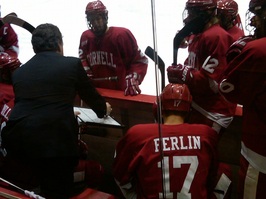
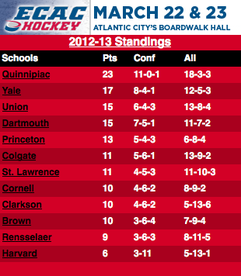




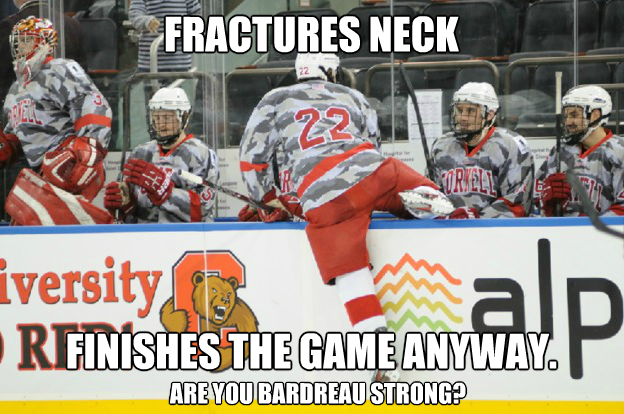





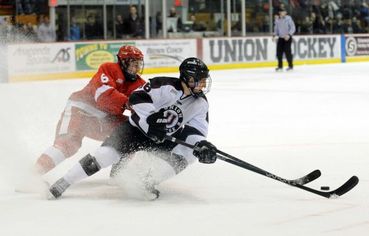



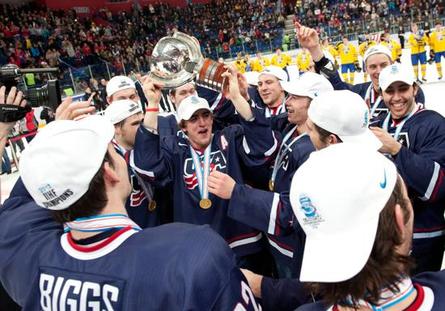
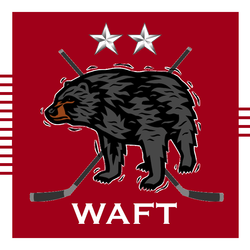

 RSS Feed
RSS Feed
